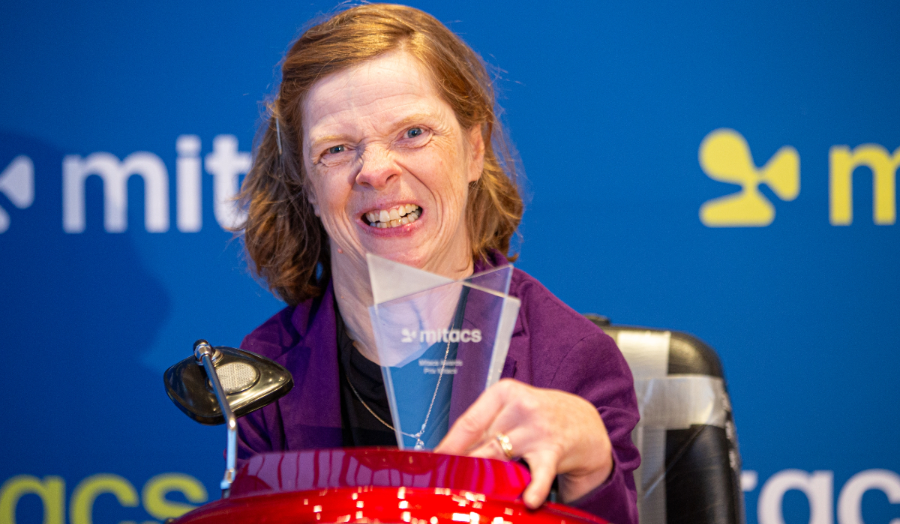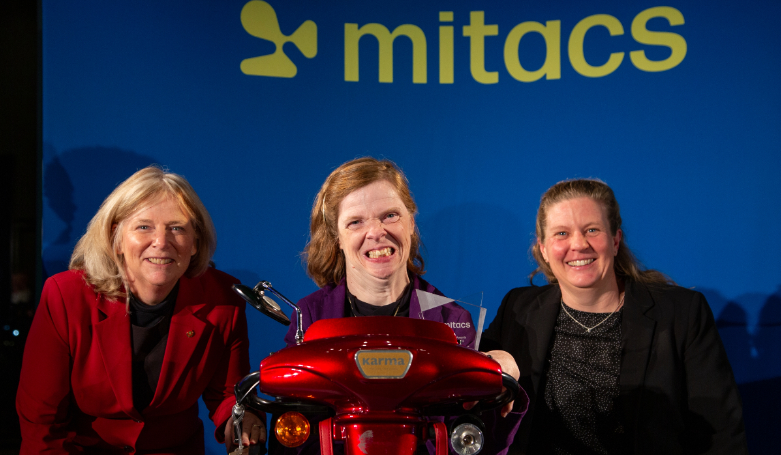Glenda Watson Hyatt, a Master's student in the Mechanical and Material Engineering department, was recognized with the prestigious 2023 Mitacs Award for Outstanding Innovation–Master's for her work in promoting and implementing accessibility. Not only is her research significant to academia, it is a call to action for workplaces everywhere.

Above: Glenda Watson Hyatt with her 2023 Mitacs Award for Outstanding Innovation–Master's.
In 2019, the Accessible Canada Act was enacted with the goal of eliminating barriers for individuals with disabilities in their pursuit of employment opportunities. To comply with this act, employers are required to make significant changes to their hiring and management practices by January 1, 2040. However, the existing body of knowledge on workplace communication best practices predominantly focuses on issues related to hearing or sight impairments.
Glenda Watson Hyatt, drawing from her personal experience living with cerebral palsy, explained, "It continues to puzzle me that a significant portion of our society mistakenly associates the ability to speak with the ability to hear and comprehend. They often assume that I lack understanding or hearing capabilities, resulting in speaking louder and more slowly. Some resort to using gestures, as if a spontaneous game of charades has begun, or, at worst, they completely disregard and dismiss me."
Despite the fact that more than half a million Canadians over the age of four are affected by speech-related disabilities, there is a significant lack of awareness around how to create inclusive work environments for individuals with speech impairments.
Reflecting on her own encounters, Watson Hyatt recognized the need to gather insights and experiences from individuals with speech disabilities in their pursuit of employment opportunities. Her research exposed the negative experiences during the hiring process as well as workplace relationships and interactions that people with speech disabilities have faced. The primary obstacle in securing and retaining employment stems from the lack of awareness and acceptance.
Watson Hyatt emphasized, "Systemic discrimination and ableism against this segment of the disabled population create formidable hurdles in the job-seeking process, often resulting in unwarranted physical and mental stress. Speech disabilities and the need for communication access remain largely misunderstood by the general public, emphasizing the urgent need for public awareness and education."

Above (left to right): Dr. Nancy Ross, Vice-Principal (Research), Glenda Watson Hyatt, and research supervisor, Dr. Claire Davies celebrate at the Mitacs Award ceremony.
Collaborating with the Canadian Council on Rehabilitation and Work (CCRW), the research team is leveraging these findings to develop online resources, training materials, and best practice recommendations tailored to employers. Furthermore, they are actively engaged in the preparation of a national strategy aimed at advancing equity in the employment of individuals with speech disabilities, ultimately working to increase their participation in the workforce.
Watson Hyatt’s research serves as a pivotal catalyst for change. During the Mitacs Award ceremony on November 22, 2023, Dr. Nancy Ross, Vice-Principal (Research), recognized Watson Hyatt’s impact: "Congratulations to Glenda on her outstanding work on equity in communication, and to Mitacs for recognizing the impact of this work. This research contributes to creating a more inclusive and equitable society, fulfilling science's ultimate goal of improving the quality of human life."
The incredible impact of Glenda Watson Hyatt’s research was also recognized by the Queen’s Gazette and The Kingstonist.
Photos, quotes, and information were pulled from the original article, Overcoming employment barriers for people with speech related disabilities by Catarina Chagas, Research Outreach and Events Specialist, in the Queen’s Gazette.